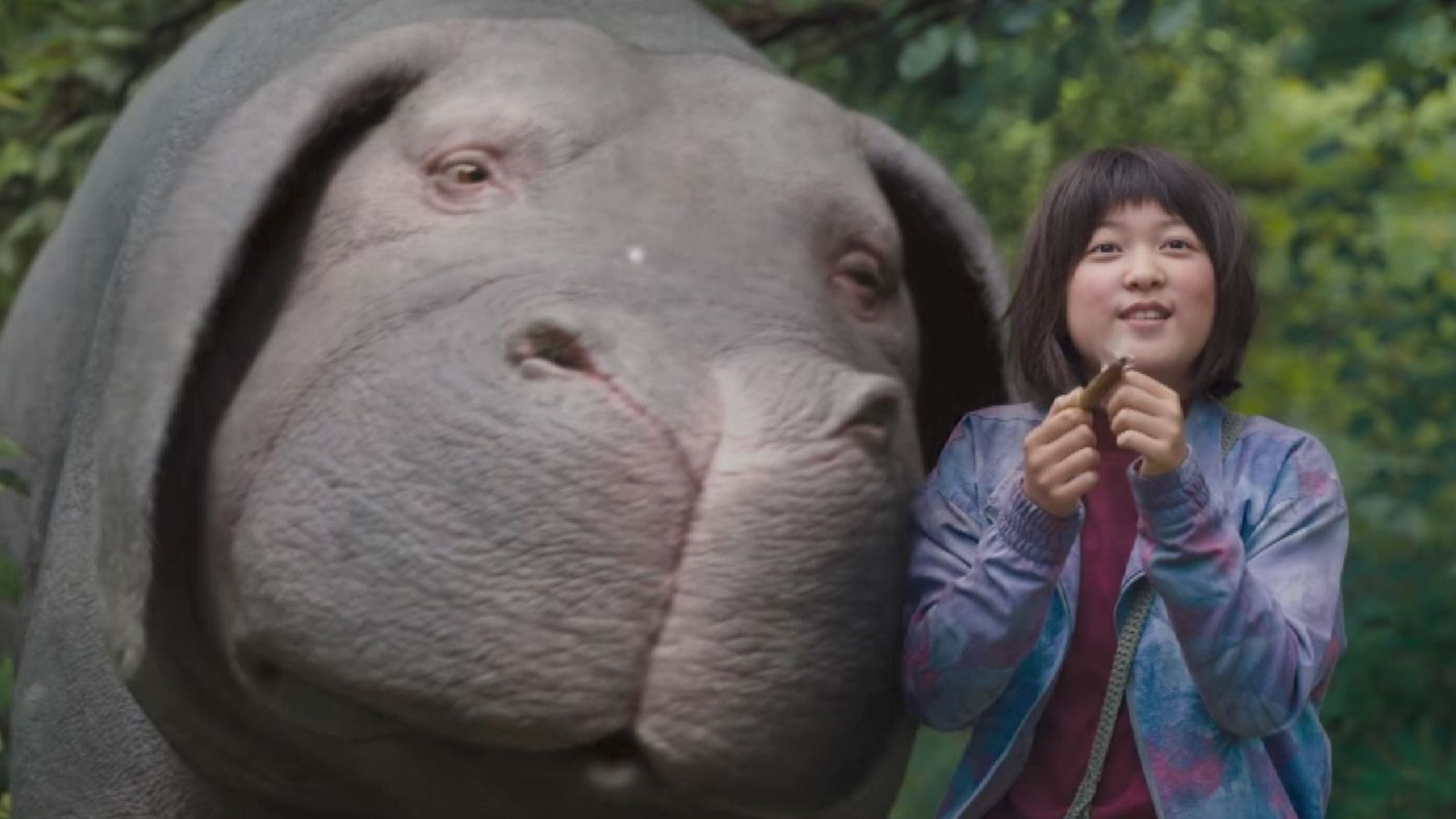At its most basic level, “Okja” is a
“child-and-their-lovable-pet” film. In the mountains of South Korea, Orphan
Mija (Seo-Hyun Ahn) lives an isolated, carefree life with her guardian Hee Bong
(Hee-Bong Byun) and her adorable pet Okja-- a giant “Super Pig” that resembles
a pig crossed with a Hippopotamus. Mija and Okja run around together, eat
persimmons, go swimming in waterholes and take naps together. Cute.
When a movie involves animals, it doesn’t take much for the audience
to be engaged. Seriously, just throw a dog or cat on the screen for a second and
I’ll feel all warm and fuzzy inside. Okja is a gentle, benevolent creature, so
of course we love her immediately. However, “Okja” has greater ambitions beyond
being a simple tale of a girl and her creature, which is good but it also
prevents this core relationship from being as poignant as it should be.
Directed and co scripted by Bong Joon Ho, (“Snowpiercer, “
“The Host”) “Okja” is a scathing commentary on capitalism’s icky underbelly.
It’s about exploitation and selling out and how crucial a role
marketing/branding play in distorting and repackaging the ugly truth behind
certain capitalistic enterprises. Okja was created in a lab (along with
thousands of other Super Pigs) by multinational corporation Mirando as a new
kind of livestock to be used for meat. As a marketing ploy, twenty-six Super
Pigs were sent to twenty-six different farmers from around the globe (one of
those farmers being Hee Bong) to be raised, to create the illusion that these
creatures were found in nature and farmed in a free-range environment.
“Okja” also tackles
the controversial abusive practices used in factory farming and our collective
complicity in it. For audiences, this may be the film’s hardest issue to confront.
Most of us don't want animals to be abused, even if they’re being used for food
but due to socioeconomic factors we often have to keep supporting these
corporations that employ abusive slaughter practices. The film does a good job
of being critical while also acknowledging the difficulty in stopping it
altogether. As long as there’s a demand for cheap meat, these hasty, abusive
practices will continue.
Considering all these weighty issues, the film could have
been excruciatingly didactic in the wrong directors hands but Joon Ho handles
the material with sincerity and evenhandedness, organizing the material in a
fast paced, energetic adventure structure. When the company comes to collect
Okja, plucky Mija venturing into to Seoul and eventually traveling to New York
to get her beloved pet back.
Joon Ho takes the material seriously, letting the social
commentary sting and make you uncomfortable at times, while also allowing for
nuttiness and playful mocking. The script is injected with plenty of offbeat
humor (the gags involving a group of animal rights activists are among the
best) and Joon Ho populates the film with giddily eccentric supporting
characters. Tilda Swinton is a delight as peppy but wildly insecure Lucy
Mirando, the current CEO of Mirando and the creator of the Super Pig project.
Meanwhile, Jake Gyllenhaal gives a bizarre, out of left field performance as
Johnny Wilcox, a former animal reality TV show host who’s now shilling for Mirando.
Joon Ho avoids turning these characters into evil, one-dimensional, money
obsessed caricatures. Both are seemingly good people with good intentions that
are ultimately compromised by desperation and the pressure to achieve success
and make money. We see this very prominently in Wilcox, an animal lover who, in
tough times, sells his integrity in order to survive.
Unfortunately, the core relationship between Mija and Okja sort
of gets lost in all this other stuff. Due to the film’s kidnap-and-rescue
structure, we get few intimate moments between the two (outside of the
beginning section in rural South Korea). They spend a majority of the film
separated. Ultimately, the movie becomes more about the people and the activity
surrounding Mija and Okja rather then Okja and Mija; the corporation that wants
Okja (and later Mija, in another marketing ploy) or the animal rights group
that wants to expose Mirando’s sinister practices to the world.
This is all well and good but as a result, the bond between
Mija and Okja feels underdeveloped and neglected. In fact, it becomes the least
memorable part of the film and both Mija and Okja remain fairly
one-dimensional. Okja is cute and lovable in a surface level way-- she doesn’t
have much personality, partly because we don’t see much of her after she gets
captured. It would have been better for
the film to spend more time with just Okja and Mija instead of quickly
separating them. There’s plenty in “Okja” to make it worth a watch but this is
still a disappointing hiccup.


No comments:
Post a Comment